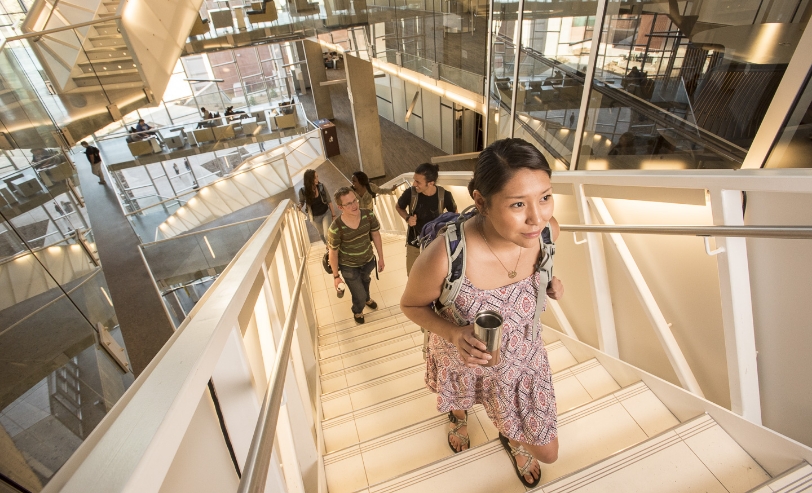Northern Arizona University (NAU) wants to power economic and social mobility through two enterprising initiatives that aim to broaden participation in higher education among individuals from underrepresented groups, close achievement gaps, and improve post-college outcomes. The statistical landscape in Arizona that prompted NAU’s undertaking is sobering: 39% of 25- to 64-year-olds have earned an associate degree or higher today, and 17% of ninth graders will earn a postsecondary degree by 2029. These outcomes are even lower for historically underrepresented groups in the state. In response, NAU decided that bold intervention was required to meet the projected employment opportunities in high-wage, high-demand fields—nearly two-thirds of which require some form of postsecondary education—by creating affordable, equitable, and accessible pathways.
Launching in the fall 2023 semester are NAU’s new Access2Excellence (A2E) program and its new admissions pilot program. A2E uses financial aid and scholarships to ensure every Arizona undergraduate with a household income of $65,000 or less can attend NAU tuition free. The impact of this program is seismic, with nearly half of Arizona’s households qualifying for A2E. NAU’s pilot program, which complements the clear message of affordability offered by A2E, guarantees admission to students who meet Arizona high school graduation requirements with a 3.0 GPA or higher. By revising its admissions standards so they align with Arizona high school graduation requirements, more than 50,000 additional students could qualify for admission. The university’s strategy behind these two programs is to remove the financial and academic roadblocks that have prevented talented, diverse students from pursuing postsecondary education, thereby undermining their college-going aspirations. Both programs are sending a clear, transformative message to potential students and their families: Postsecondary education at NAU is affordable, accessible, offers tremendous value, and supports lifelong success.
The Methodology
To deliver the A2E and admission pilot programs, NAU pulled together a diverse leadership team. Representatives from enrollment management, scholarships and financial aid, finance, economic analysis, curriculum and academic support, and other areas researched and implemented these equity-focused changes. Among their goals were to increase college attendance, support the success of students enrolling in these programs, and secure NAU’s long-term financial health so it can deliver exceptional academic programs.
Beginning in summer 2021, the university’s leadership team engaged in an incremental intensive study of how to leverage existing resources and adapt institutional policies to refocus the university on access, attainment, and excellence. For A2E, officials extensively reviewed NAU’s current scholarship and financial aid awarding process through the lens of an access-first philosophy. Adjustments to these criteria broadened access while continuing to support all students, including highly meritorious students and those from households earning more than $65,000 per year. Undergraduate first-year and transfer students who attend NAU in Flagstaff or one of the university’s statewide campuses must submit a Free Application for Federal Student Aid (FAFSA) to determine initial and ongoing income eligibility and must be enrolled full time with 12 or more credits. The admissions pilot program was informed by a detailed analysis of academic success and a clear gap between university admissions criteria and high school course offerings in the state. NAU found that a student’s GPA is the best predictor of their future success—not high school coursework. Through a policy change authorized by the Arizona Board of Regents, NAU was able to admit students based on their academic performance in the courses offered at their high schools. Ultimately, NAU was also able to ensure that the cost of attendance for all Arizona students, regardless of household income level, is lower than other in-state options, communicating a clear value proposition to Arizonans that a pathway to an affordable, high-quality education exists at NAU. Both high-impact programs are emblematic of NAU’s commitment to equitable postsecondary value.
The Impact
Through these initiatives, NAU seeks to be the state’s leading engine of opportunity and driver of social impact by increasing the number and diversity of Arizona residents with high-quality postsecondary degrees and certificates. As such, the university intends to help the state reduce unemployment and underemployment, increase wages, bolster civic engagement and voter participation, advance equity and justice, and enhance the social well-being and the economic competitiveness of the state. But the impact on the state’s residents is more immediate. About half the state’s population live in households with incomes of $65,000 or less, making them eligible for the A2E program. And more than 50,000 students qualify for the admissions pilot program. The university’s institutional research and enrollment management units are expected to monitor the students in these programs, particularly those from underserved communities, and identify needs for additional resources and support.
Key Takeaways
“NAU’s transformative, equity-focused mission through which it aligned scholarship awards, financial aid packaging, and admission standards was made possible without new funding streams. The university’s sustainable adjustments were accomplished with existing resources that served students and underrepresented communities for whom higher education has often been unattainable.
Provided quote Access2Excellence:
NAU’s Access2Excellence initiative is a transformative step to help bridge our state’s attainment gap and provide an affordable pathway to college, ensuring Arizona develops and retains talent that can participate in the high-tech, high-skill jobs that power the economy of the future.”
Neil Giuliano, president and CEO, Greater Phoenix Leadership
Provided quote Admissions Pilot Program:
I believe this will be transformative for our students and our state. Aligning admission to NAU with standards that already exist within our K–12 system provides a clear and transparent message to Arizona students who work hard that they can and will be able to go to college
Kathy Hoffman, Arizona’s State Superintendent of Public Instruction
